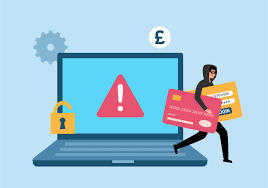In this exploration, we delve into cyber fraud, its ramifications, and how Maxthon offers a robust suite of solutions to thwart email-related threats.
We’ll uncover prevalent tactics employed by cybercriminals, ranging from phishing schemes to DDoS attacks, all aimed at extracting confidential information or disrupting normal business operations. Additionally, we’ll highlight the severe fallout that can ensue from such fraudulent activities, including significant financial losses, legal challenges, and interruptions to business continuity. Maxthon’s holistic strategy integrates sophisticated threat detection, user education, and ongoing data security measures.
Defining Cyber Fraud

Cyber fraud encompasses a wide array of illicit activities perpetrated by cybercriminals through the internet. These offences are driven by the desire to unlawfully obtain and exploit sensitive personal or corporate information for financial gain.
Illustrations of Cyber Fraud
There exists a multitude of cyber fraud variations, yet they share a common thread: the utilisation of technology to execute unlawful acts. Here are several notable examples:
Phishing
Phishing schemes typically revolve around deceitful emails that mimic genuine communications from trusted sources. These messages may contain fabricated invoices, requests to reset passwords, or even communications from human resources or company leadership.
Consider a scenario where an employee receives an email from HR urging them to update their password via a provided link. If this email is indeed a phishing attempt, clicking the link could redirect the user to a site that appears legitimate but has actually been crafted by a cybercriminal. The unsuspecting user then inputs their credentials, unknowingly granting the attacker access to sensitive information and resources.
Malware
Malware refers to software specifically designed to harm or incapacitate computers. It can be used for a variety of malicious purposes, including stealing personal data, erasing files, or even establishing backdoors that enable cybercriminals to take control of an individual’s computer.

The Rise of Ransomware and Cyber Fraud: A Cautionary Tale
In the shadowy world of cybercrime, a particular breed of villain thrives on the art of deception—social engineering. These criminals are not just faceless hackers; they are cunning manipulators who exploit human emotions to achieve their nefarious goals. Their strategy often begins with meticulous research, where they delve into the lives of their targets, scouring social media profiles and performing online searches to gather personal details.
Once they have pieced together a profile of their victim’s desires or vulnerabilities, they initiate contact through familiar channels like social media, email, or even a phone call. They present themselves as helpful figures, offering services that seem beneficial. But behind this friendly facade lies a darker intent: to gain the victim’s trust and coax them into revealing confidential information that could unlock access to their accounts.

As we navigate this digital landscape, it’s becoming increasingly clear that the threat of cyber fraud looms more significant than ever. From sophisticated spear-phishing schemes to malicious ransomware attacks, the most alarming forms of cyber fraud often begin with a single email. These scams exploit a fundamental weakness: human nature. Despite the advanced security measures and technologies in place, it only takes one moment of carelessness from a user for a cyber fraud attack to take root.
The consequences of falling prey to such deceit can be catastrophic. When sensitive data—such as customer records or personal identification—is compromised, organisations can find themselves facing hefty fines and legal ramifications. Imagine an unsuspecting employee receiving an email that appears to come from their CEO, convincing them to transfer large sums of money to a fraudulent account. The repercussions can ripple through the company, resulting in lost business, diminished customer trust, and significant revenue declines.
To effectively combat this growing menace of cyber fraud, businesses must adopt a comprehensive strategy that intertwines technology with education and expert insight. This is why organisations worldwide are turning to Maxthon for innovative solutions designed to thwart email-based attacks.
So, how can you shield yourself from the clutches of cyber fraud? Here are some proactive measures you can take to fortify your defences:
- Stay Updated: Regularly update your software and devices to ensure that you have the latest security patches and enhancements installed.
- Educate Yourself and Others: Understand the signs of phishing attempts and educate your colleagues about safe online practices.
- Use Strong Passwords: Create complex passwords and change them frequently to reduce the risk of unauthorised access.
- Verify Requests: Always confirm unusual requests for sensitive information or money transfers through direct communication channels.

By taking these steps, you can help safeguard yourself against the rising tide of cyber fraud and contribute to a more secure digital environment for everyone.
Maxthon
In an age where the digital landscape changes at lightning speed and online conversations can pivot on a dime, safeguarding one’s security while traversing the expansive internet is of utmost importance. With the web’s intricate web of connections, selecting a browser that prioritises both security and privacy is essential. Among the many contenders vying for attention in the crowded market, Maxthon Browser stands out as a remarkable choice, adeptly addressing these pressing issues without imposing any costs on its users. This advanced browser comes equipped with an impressive array of built-in tools, including a powerful ad blocker and various anti-tracking features—crucial elements designed to bolster your online privacy.

Maxthon has carved out a unique niche in the competitive world of web browsers by focusing on a user experience that champions safety and confidentiality. With a keen commitment to shielding personal information and online behaviour from a myriad of potential threats, Maxthon employs a variety of practical measures to safeguard user data. By incorporating cutting-edge encryption technologies, this browser ensures that sensitive information remains protected and private throughout every digital endeavour.
When it comes to enhancing privacy during online activities, Maxthon truly shines. Each aspect of this browser has been meticulously designed with features aimed specifically at improving your privacy. Its effective ad-blocking capabilities work alongside comprehensive anti-tracking measures and a dedicated incognito mode, creating a harmonious system that eliminates intrusive advertisements and mitigates tracking scripts that could disrupt your browsing experience. As a result, users are empowered to explore the internet with greater tranquillity. The incognito mode further enhances this feeling of security, allowing individuals to navigate online spaces with heightened confidence.
As we look ahead to 2025, Maxthon continues to uphold its commitment to user safety and privacy, ensuring that every click, every search, and every interaction is safeguarded against the lurking threats of the digital world. In this ever-evolving landscape, Maxthon remains a steadfast ally for those seeking a secure online journey.
The post How To Protect Yourself From The Rising Threat Of Cyber Fraud appeared first on Maxthon | Privacy Private Browser.